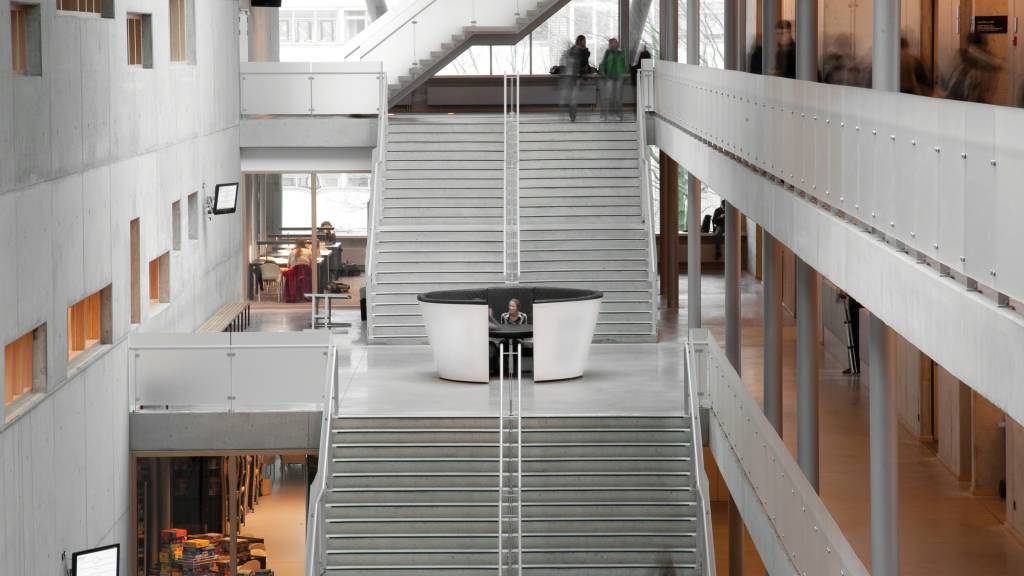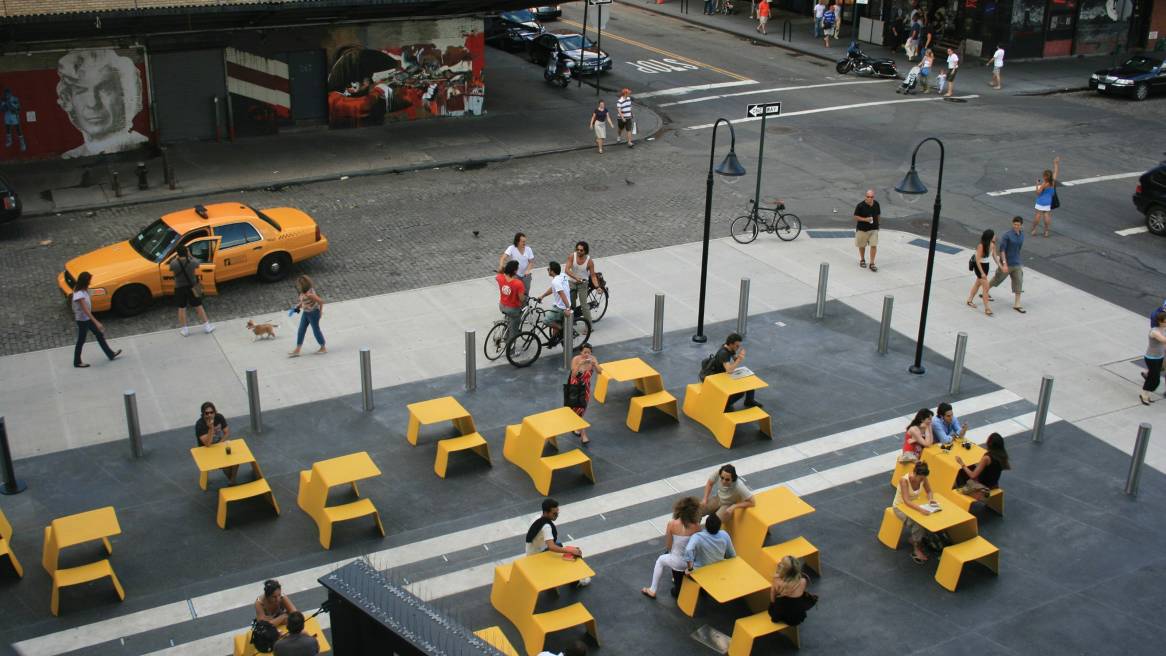Find Your Fresh Perspective Outdoors: Design Q+A
The founder of Extremis shares his expertise for designing outdoor furniture his company calls “tools for togetherness.”
With headquarters in Poperinge, Belgium, Extremis has been designing and making furniture for 25 years. Their design ethos is derived from a Shaker quote: “Don’t make anything, unless it is both necessary and useful… and if it is, don’t hesitate to make it beautiful.” Recently, Extremis announced a new collaboration with Steelcase to bring its outdoor designs to more workplaces in North America.
Extremis founder, owner, head designer and big boss Dirk Wynants leads the company he began decades ago in his garage as a labor of love where he built a table for his wife. His designs stand the test of time. Many have remained in his collection for 20 years. Wynants is still very hands-on at Extremis. In fact, the day 360 spoke to him, he had just helped his team load a truck full of designs bound for a New York show. We asked him to share his expertise for designing outdoor furniture Extremis calls “tools for togetherness.”
360: You have always been drawn to making things. How did you start up Extremis?
DW: I’ve been making stuff since I was a very small kid. I worked in my father’s shed with all kinds of tools, my father complained every evening about the damage I did to his fine woodworking materials. From the time I was a child, it was automatic to create things.
I decided that I would start my own company at the age of 30. So, as I approached 30, I was thinking, “What kind of furniture do I want to make?” Looking at the competition,there was a big gap in outdoor design. You could find classical or plastic things, but nothing like I was looking for. In fact, my wife asked me to buy an outdoor table and I couldn’t find anything that pleased me. So, I designed it myself. That was the start. Today, we consider ourselves a design furniture company that happens to make a lot of stuff for the outdoors.
360: How has your business changed as people have begun seeking a more residential vibe at work?
DW: When we started, we mainly focused on residential — people who wanted something different for nice, contemporary houses and couldn’t find anything that fit. We didn’t change ourselves to the corporate market, it was the corporate market that changed in our direction. We can’t take any credit as visionaries. The corporate market evolved to place a higher importance on buying good furniture, and the reason for that is quite simple. For every company today, the biggest asset is the people that work in it. The importance of good quality working environments has increased exponentially and will continue to increase. Of course, it’s not only about adding extra furniture, we have to offer a lot more. But, making a nice environment to work in, to spend time in, to feel good and to feel safe is super important. We have to make spaces where people feel good.
360: What benefits do you see for people who spend time working outside?
DW: Most of what we make ends up outdoors, but we estimate 30 percent ends up indoors. That’s perfectly fine by us. What we want to do is we want to take away barriers between inside and outside and between work and play. It’s about working in a different environment, which provides you different mindset. Sometimes a different mindset is absolutely necessary to work on a specific kind of job. If you want to have a creative meeting, you have to create a creative setting to find the right mindset to do that kind of work.
Our furniture helps people do that because you’re using furniture that was designed to provide better interaction between people – the starting point of our designs. We never think, “Let’s make a new chair.” No. We go back further and say, “Let’s observe how people interact and see what designs come from that.”
360: Besides collaboration, what do you observe about the benefits of getting outside?
DW: The comfort level in buildings has become so good you often don’t know whether you’re inside or outside, or if it’s winter or summer. We are completely detached from seasons for a big part of our lives. At Extremis we use outdoor spaces for meetings all the time. It gives you fresh air. Even if the weather is not perfect, we go sit outside under the shelter and it’s still better than spending the whole day inside. But, if you don’t have the outside space, you can create the perfect setting indoors as well, which can provide you with almost the same feeling. Because people want to feel at home nowadays when they’re at work. Jobs didn’t become easier in last few decades and jobs will keep asking more of people in the near future, so we need to give our minds a way of regenerating to cope with the stress of our lives.

360: How do you recommend making the most out of the limited outdoor spaces we see in many urban workplaces?
DW: Expectations are that about 70 percent of people will live in cities by 2050, meaning that living spaces are even getting smaller and smaller. So, we have to be clever how to use these spaces. In the last few years, we’ve really focused on providing solutions for smaller spaces. Multi-functionality is one of the solutions. We make things that can be used for more than one, often many, purposes.
Kosmos is a perfect example as it is intended to be multi-functional. It was inspired by the versatility and comfort of yacht furniture and can serve as a gathering place within a cocoon-like environment. It can also transform into a lounge sofa piece by pushing the tabletop down to the same level as the benches.
360: How do you design differently for the outdoors?
DW: Designing for outdoors is much more difficult. The limitations are bigger. When you design stuff for the outdoors, you are limited in the kind of materials you can use because they have to be able to cope with the elements. They are usually more expensive. At the same time, the product value of an outdoor piece is less than an indoor piece in general. So, we have to be super creative to cope with seasonality, a higher cost of materials and a lower product value. That makes it extra difficult. But, we don’t mind. The more restrictions you have, the more we can differentiate ourselves. We have an opportunity to offer stuff nobody else has. If it were simple, everybody could do it.
EXPLORE EXTREMIS
Discover how the new collaboration between Steelcase and Extremis brings customers and designers easy access to more choices.
 Dirk Wynants is the founder & visionary behind Extremis, a West Flanders-based design furniture brand. An interior architect and furniture designer by education, Dirk founded Extremis in 1994 for the realization of his vision for what was lacking of the outdoor furniture market. With form always following function, the center of his design philosophy is solving problems. A commitment to innovation & superior quality materials differentiates Extremis and brings timeless designs to the market, all while never losing sight of ecology & sustainability. Dirk lives with this wife and children in the village of Poperinge Belgium where the company is headquartered. He can be found most days managing Extremis, his own design studio, Dirk Wynants Design Works or horseback riding in the Belgian countryside.
Dirk Wynants is the founder & visionary behind Extremis, a West Flanders-based design furniture brand. An interior architect and furniture designer by education, Dirk founded Extremis in 1994 for the realization of his vision for what was lacking of the outdoor furniture market. With form always following function, the center of his design philosophy is solving problems. A commitment to innovation & superior quality materials differentiates Extremis and brings timeless designs to the market, all while never losing sight of ecology & sustainability. Dirk lives with this wife and children in the village of Poperinge Belgium where the company is headquartered. He can be found most days managing Extremis, his own design studio, Dirk Wynants Design Works or horseback riding in the Belgian countryside.


